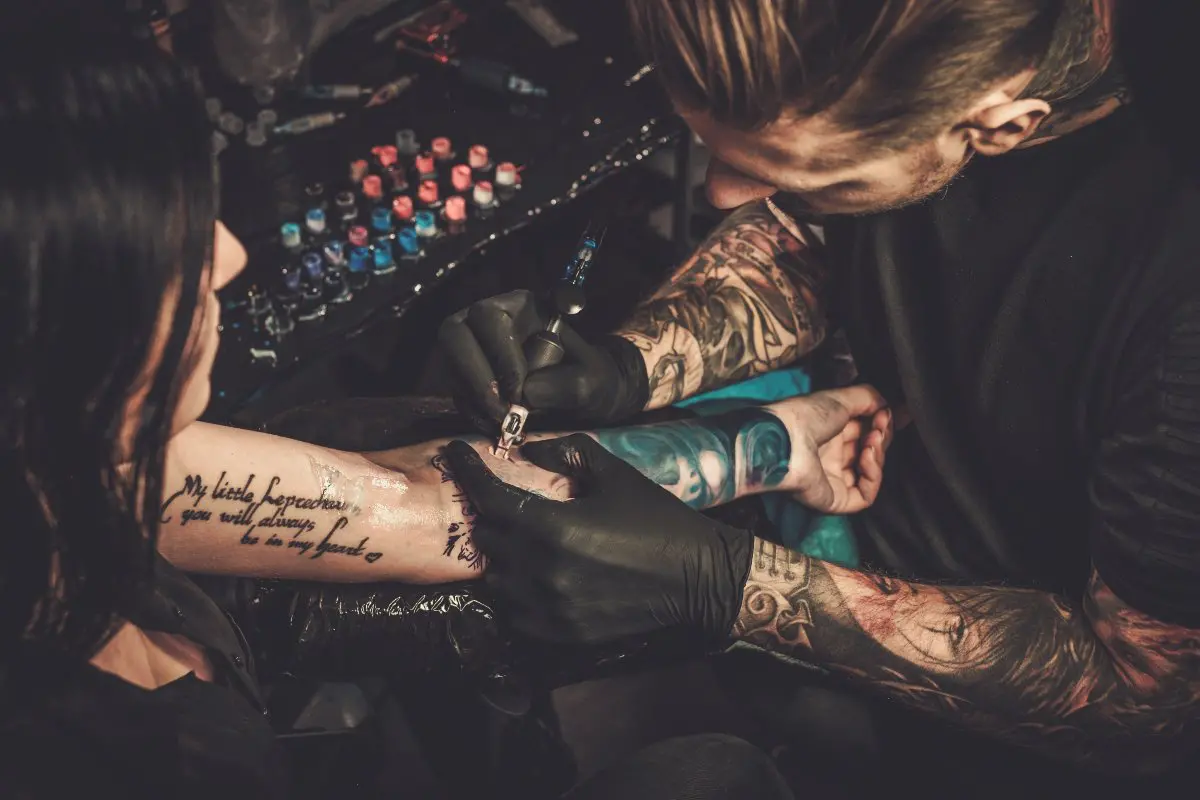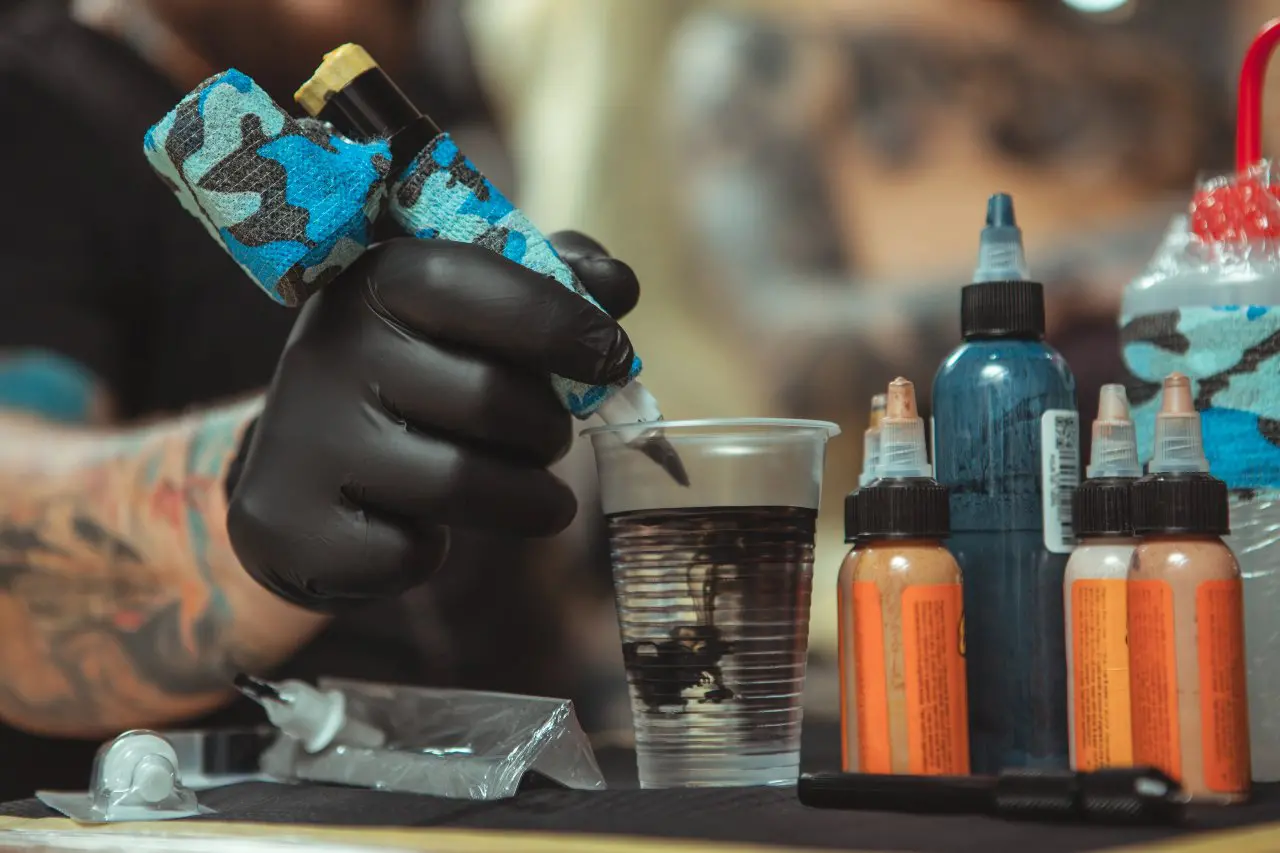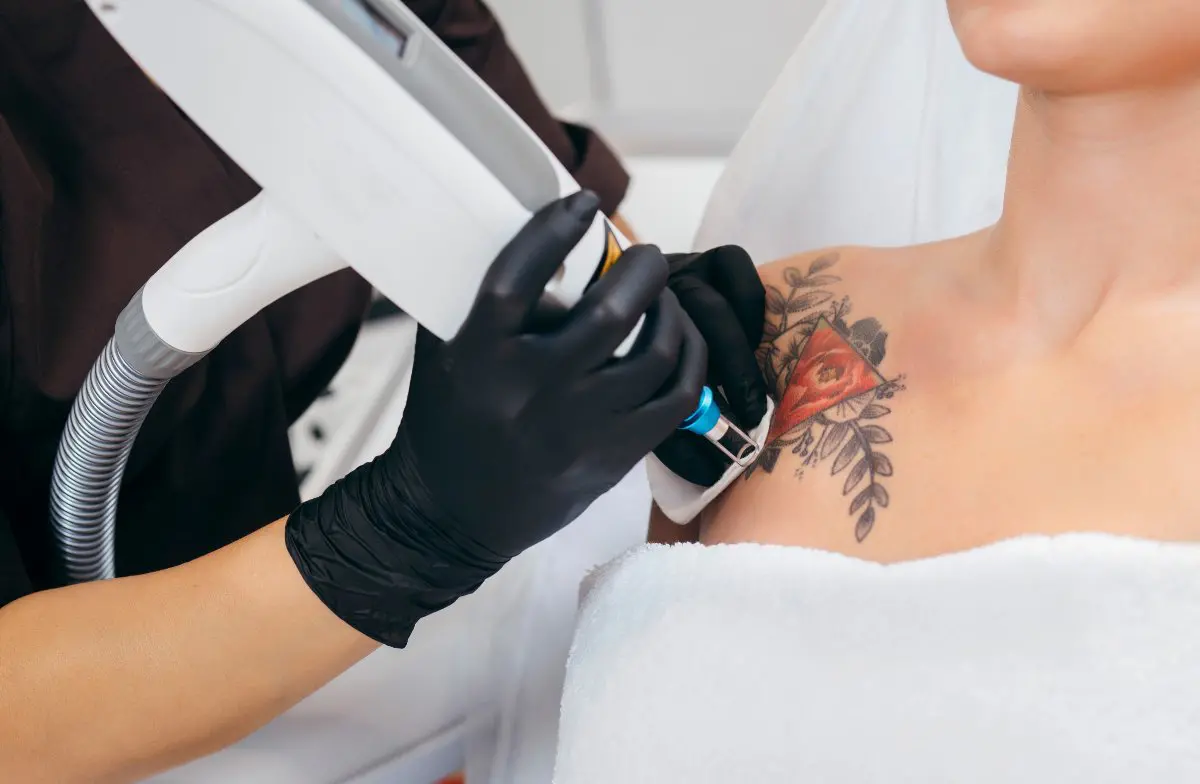Table of Contents
- Tattoo Market
- Opening a Tattoo Shop? Step by Step Guide
- Study the Market & Consumers
- Form a Well-Thought-Out Business Plan
- Find a Workspace for Your Tattoo Shop
- Name Your Tattoo Business
- Establish a Legal Business Entity
- Register for Taxes
- Know the Regulations, Have the Necessary Permits and Tattoo Shop Licensing
- Decide on How Much You’ll Charge Your Customers
- Keep Your Business and Personal Accounts Separate
- Do Business Accounting
- Obtain the Necessary Tattoo Shop Tools and Instruments
- Acquire the Necessary Software and Tattoo Equipment
- Apply for Business Insurance
- Promote and Market Your Tattoo Parlor
- Work on Yourself
- Expand Your Tattoo Business
- Differentiate Yourself
- How Much Does It Cost to Open a Tattoo Shop?
- How to Start a Tattoo Removal Business
- Customer Financing Solutions for Tattoo Shops: The Benefits
- Wrapping Up
“Show me a man with a tattoo, and I’ll show you a man with an interesting past,” Jack London.
Tattoos are one of the most favored forms of self-expression. According to Ibis World, the number of tattoo businesses is 29,235 in the U.S. as of 2021, a 6.2% increase from 2020.
Are you interested in opening a tattoo shop? How much does it cost to open a tattoo shop? Let’s discuss it together.
Tattoo Market

Tattoos are a social and aesthetic phenomenon typical of all socioeconomic classes. They’re a way to express ideas, emotions, experiences, and desires. In recent years, tattoo lovers have been growing in number exponentially.
The love of tattoos has been seeing a boom since COVID-19 began. The top followers represent the group between 20 and 45 years old. And those aged between 25 and 35 make up the largest group.
According to IBIS World, the industry accounts for $1.4 billion as of 2021. The U.S. represents the biggest tattoo market generating $1.1 billion annually.
Opening a Tattoo Shop? Step by Step Guide
How to open a tattoo shop? This isn’t an easy task. However, it’s doable with proper steps and tools. Here are 17 steps to take.
Study the Market & Consumers
Some tattoo studios are open to walk-ins. Others require reservations and may refuse to serve a client that doesn’t represent their brand values.
As for customers, they’re usually of three types:
- The first group is interested in custom or signature designs created by a particular artist
- The second group wants something already existing
- The third group needs some correction or restoration.
Form a Well-Thought-Out Business Plan
Write your business plan to better figure out how to open a tattoo shop. It’s the foundation of your business and can guide you through each stage of the launch and management of your tattoo business. You can turn to a professional accountant for help.
Find a Workspace for Your Tattoo Shop

One of the options is to use your house as your workspace. However, many states’ health regulations don’t allow home tattoo studios. Moreover, take into account that establishing yourself as a professional without a storefront is more complicated.
Additionally, you can rent a building. In this case, make sure to get written permission from the owner before making any renovation.
Another option is to open a tattoo studio. For this, you’ll need a space of 80 to 120 square meters divided into:
- Reception
- Work area
- Sterilization area
- Restroom
This can be a warehouse or office equipped with quality furniture. Any location will need proper ventilation and lighting
It’s critical to make the right choice concerning your tattoo business location. First, ensure the area isn’t saturated with tattoo shops and has enough foot traffic. Then, find out what reputation these studios have and what services they offer. Even though a place in a trendy area might be expensive, it might be more visible to potential customers.
Name Your Tattoo Business
The issue of “how to start a tattoo shop” is closely related to “how to name a business.” A good name will successfully reflect your business’s identity and goals. Also, it plays a significant role in terms of marketing. Specifically, it’ll help your customers identify the quality of your products and remember them. Consider using a business-naming guide to make the right choice.
Establish a Legal Business Entity
A legal entity is a registered company or organization. It can sign contracts, sue, or be sued in a court of law. Also, it must prepare statements to report on its performance. Legal entities include sole proprietorships, partnerships, limited liability companies (LLCs), and corporations.
Register for Taxes

Register for state and federal taxes. Taxes vary from business structure to business structure. E.g., LLC taxation depends on several factors, including whether you’re a single-member LLC or multi-member LLC.
Know the Regulations, Have the Necessary Permits and Tattoo Shop Licensing
Different states have different laws. Mostly, you’ll need to have an annual permit from your state’s health department. Prohibited potential clients include those younger than 18 or under the influence of drugs or alcohol.
However, in some states, minors can get tattooed with parental consent. If you fail to acquire the necessary permits and tattoo shop licenses, you may end up with hefty fines or lose your business.
Decide on How Much You’ll Charge Your Customers
As a rule, studios charge customers an hourly rate. However, some projects charge a flat fee. Hourly rates are between $80 and $350. Your longer time in business and your popularity will help you earn more.
Some successful tattoo artists have reported raising less than $15,000 their first year. Others who enjoy more popularity have reported earning more than $100,000 per year.
Keep Your Business and Personal Accounts Separate
The Internal Revenue Service (IRS) recommends keeping separate business and personal accounts. Individual accounts facilitate the accounting and tax filing processes. Also, they can help you better protect your assets in case your business is sued, or you default on a debt.
Do Business Accounting
Business accounting helps effectively record, analyze, interpret and present your financial information. Specifically, accounting helps with generating invoices and completing payrolls. Therefore, proper accounting is especially crucial in the early stages.
Obtain the Necessary Tattoo Shop Tools and Instruments

You’ll need special tattoo tools and devices to apply sterilization measures. E.g., some tattoo shops use an autoclave for sterilization. Others use disposable instruments. These are devices or supplies for one-time or temporary use, such as rubber gloves.
Consider obtaining the following:
- Cotton swabs
- Disinfectant
- Dyes
- Forceps
- Gloves
- Needles
- Pigments
- Sketching paper
- Storage containers
- Taper needles
- Tattoo machine with ink
- Toothpicks
Acquire the Necessary Software and Tattoo Equipment
When it comes to equipment, software, and additional items, consider:
- Computer with design software
- Directed lighting in each work area
- Drawers or desks with bench
- Mirrors
- Oral and written instructions for your clients concerning care
- Reclining chairs or tables for tattooing with adjustable positions
- Software to track appointments, expenses, and revenue
- Tattoo benches
- Tattoo magazines
- Workstations
Apply for Business Insurance
Apply to a business insurance company. The latter will protect your company’s financial wellbeing if you experience a covered loss.
Promote and Market Your Tattoo Parlor
Start marketing your studio about 30 to 60 days before opening. To spread the word:
- Turn to social media platforms, namely Instagram, Facebook, and Pinterest to share posts.
- Have a professional website for your online presence.
- Use visuals such as business cards, banners, and flyers.
- Consider digital ads and paid advertisements on the radio.
- Use an online booking app for tattoo artists.
- Build a portfolio that people can view online and in person.
- If you have a logo, consider adding it to a QR code with a QR code generator.
- Consider joining the National Tattoo Association.
- Have a separate business phone line to make your business more automated and boost the legitimacy of your business.
- Make sure to offer impeccable service from the first contact. Don’t ignore your customers’ calls and messages.
- Offer special giveaways on your first day, e.g., a free tattoo. Consider posting a picture featuring one of your designs with a description explaining your giveaway.
Work on Yourself

The answer to “how to open a tattoo shop?” can’t be complete without a point about perfecting your skills. What can you do? Take tattoo business courses. Consider partnering with a seasoned tattooist who is an expert in the field. Additionally, use online forums and tutorials. If you’re a starter, enroll in an art or graphic design course. It’s essential to practice to gain more experience.
Expand Your Tattoo Business
Think of expanding your business and making it more profitable:
- Sell local art
- Offer piercings
- Sell jewelry for piercings
- Offer aftercare products
- Host special events
- Offer tattoo removal services.
Note: Some states ban tongue splitting and require all tattoo artists and piercers to have a license.
Differentiate Yourself
Make sure to know the most popular trends in your area. Then, look for a differentiator that will make you unique to stand out from the crowd. As a result, you can attract more customers and raise more revenue:
- Apply a merchandising strategy. E.g., consider collaborating with famous artists to obtain greater visibility.
- Use other merchandising tips to be more appealing to customers. E.g., take advantage of seasons and holidays as an opportunity to push the offered illustrations and items to the shop windows.
- Participate in the branding of a product. E.g., this can be sports shoes, drinks, textiles, backpacks. As a result, you’ll make your customer base wider.
- Consider creating posters for music, film, or art festivals to boost your visibility.
- Use point-of-sale advertising to target a customer during the checkout process. As a result, you’ll attract them to additional goods or services. E.g., you can offer caps, clothing, mugs, posters, and keyrings with the shop logo or other drawings that don’t reflect on a person’s skin.
- Combine your passion for tattoos with a love for music in your shop. Consider designing the shop so that the client can choose what music to enjoy while being tattooed.
- Be open to international talent. Specifically, you can invite international tattoo artists to work by appointment to share their art with your customers.
How Much Does It Cost to Open a Tattoo Shop?
You may wonder, “How much does it cost to start a tattoo shop?” Tattoo artists report spending $600 to $1,000 per year on supplies in the early stages. But, you can obtain certain items at discounts and find special deals.
Generally, business costs are of two types: fixed costs and variable costs. Fixed ones don’t shift with the amount of the items or services sold, and variable ones do. Unlike fixed costs, variable costs refer to labor and raw materials as these factors change with sales. You can use formulas to calculate fixed and variable costs.
How to Start a Tattoo Removal Business

Not everyone opening a tattoo shop will include tattoo removal as a service — however, those who do enjoy a broader customer base. If you want to diversify your offerings, let’s focus on how to start a tattoo removal business.
Based on data from Harris Poll, almost a quarter of people with tattoos have regrets. By 2027, the tattoo removal market size is projected to reach $795 million, as Allied Market Research reports.
Today, the non-invasive removal of tattoo pigments through Q-switched lasers is the standard modality for removal. This technique uses pulsed output beams. Other details:
- The appointment only takes 15 minutes from start to finish.
- Complete removal typically requires five to 10 treatments.
- Tattoo removal technicians usually charge an hourly rate of $16.55 to $33.85.
The answer to “how much does it cost to start a tattoo removal business?” is about $19,267.
Customer Financing Solutions for Tattoo Shops: The Benefits
Your customer needs your services, and you need to boost your sales. Consider requesting funding for your customers if they don’t have the cash to pay upfront and have no fear of going into debt. Why not use point-of-sale or POS financing for incremental payments?
What are the benefits?
- More foot traffic
- Increased sales
- Higher conversion rates
- More return customers
- Improved customer experience
- Innovative payment option
- Less in-house credit checks
- Access to a multi-lender network for customer financing for tattoo shops
- Higher average order value (AOV): an eCommerce metric measuring the average dollar amount spent each time customers place an order over a defined period
- Credit-building services
- Higher revenue: Buy Now, Pay Later (BNPL) services incentivize customers to spend more than they would otherwise.
All the benefits mentioned above give you an advantage and power to fight the competition in your field and grow.
Wrapping Up
Deciding on how to start a tattoo business may seem intimidating since the market is enormous and continues to grow annually. The same is also true of a tattoo removal business. You need to get equipped with the proper knowledge and tools. As a result, you’ll know how to open your tattoo shop without challenges and reach tangible results.
Namely, conduct market research, choose the right business location, learn the regulations, and obtain the necessary tools and equipment. Moreover, you can boost your success by offering an exceptional point-of-sale (POS) financing service from a reputable provider like Finturf.
Table of Contents
- Tattoo Market
- Opening a Tattoo Shop? Step by Step Guide
- Study the Market & Consumers
- Form a Well-Thought-Out Business Plan
- Find a Workspace for Your Tattoo Shop
- Name Your Tattoo Business
- Establish a Legal Business Entity
- Register for Taxes
- Know the Regulations, Have the Necessary Permits and Tattoo Shop Licensing
- Decide on How Much You’ll Charge Your Customers
- Keep Your Business and Personal Accounts Separate
- Do Business Accounting
- Obtain the Necessary Tattoo Shop Tools and Instruments
- Acquire the Necessary Software and Tattoo Equipment
- Apply for Business Insurance
- Promote and Market Your Tattoo Parlor
- Work on Yourself
- Expand Your Tattoo Business
- Differentiate Yourself
- How Much Does It Cost to Open a Tattoo Shop?
- How to Start a Tattoo Removal Business
- Customer Financing Solutions for Tattoo Shops: The Benefits
- Wrapping Up


